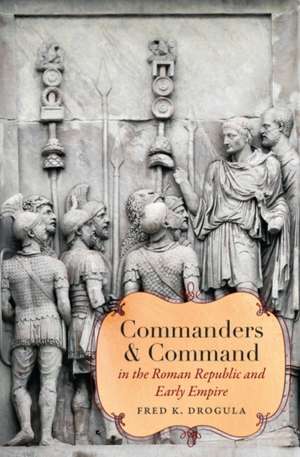Commanders and Command in the Roman Republic and Early Empire
Autor Fred K. Drogulaen Limba Engleză Paperback – 2 noi 2021
Preț: 315.58 lei
Nou
Puncte Express: 473
Preț estimativ în valută:
60.39€ • 63.21$ • 50.26£
60.39€ • 63.21$ • 50.26£
Carte tipărită la comandă
Livrare economică 31 martie-14 aprilie
Preluare comenzi: 021 569.72.76
Specificații
ISBN-13: 9781469668680
ISBN-10: 1469668688
Pagini: 434
Dimensiuni: 156 x 234 x 26 mm
Greutate: 0.66 kg
Editura: The University of North Carolina Press
ISBN-10: 1469668688
Pagini: 434
Dimensiuni: 156 x 234 x 26 mm
Greutate: 0.66 kg
Editura: The University of North Carolina Press
Notă biografică
Fred K. Drogula is Charles J. Ping Professor of Humanities and Professor of Classics at Ohio University.
Descriere
Studies the development of Roman provincial command using the terms and concepts of the Romans themselves as reference points. Beginning in the earliest years of the republic, Fred Drogula argues, provincial command was not a uniform concept fixed in positive law but rather a dynamic set of ideas shaped by traditional practice.
